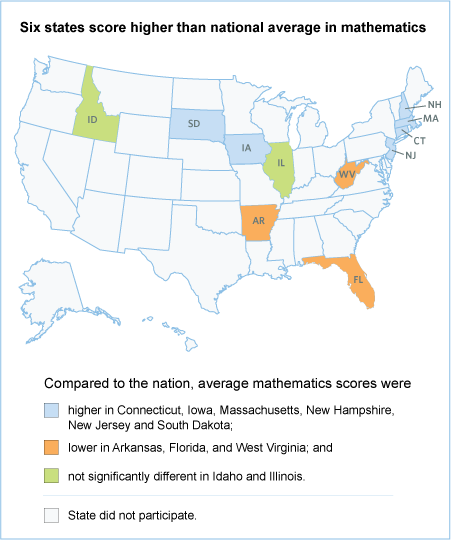|
Twelfth-graders' performance in mathematics improves since 2005

Nationally representative samples of more than 49,000 twelfth-graders participated in the 2009 National Assessment of Educational Progress (NAEP) in mathematics. On the national level, results are reported for students attending public and private schools across the nation.
The average mathematics score in 2009 was three points higher in 2009 than in 2005. Average mathematics scores were higher overall in 2009 than in 2005 for all racial/ethnic groups and for male and female students. The percentages of students at or above Proficient (26 percent) and at or above Basic (64 percent) were higher in 2009 than in 2005.
See all the grade 12 national results.
Results are also reported for twelfth-grade public school students in the 11 states that participated in the first twelfth-grade state pilot program in 2009. The states that participated are Arkansas, Connecticut, Florida, Idaho, Illinois, Iowa, Massachusetts, New Hampshire, New Jersey, South Dakota, and West Virginia.
Compared to the nation, average mathematics scores at grade 12 were higher in the following states: Connecticut, Iowa, Massachusetts, New Hampshire, New Jersey, and South Dakota. Compared to the nation, average mathematics scores were lower in the following states: Arkansas, Florida, and West Virginia. Compared to the nation, average mathematics scores were not significantly different in Idaho and Illinois.
See all the results for the 11 states that participated.
Students responded to questions designed to measure their knowledge and abilities across four content areas: number properties and operations; measurement and geometry; data analysis, statistics, and probability; and algebra. Find out more about what the mathematics assessment measures.
For more information, browse the report online or download a copy of the report.
|